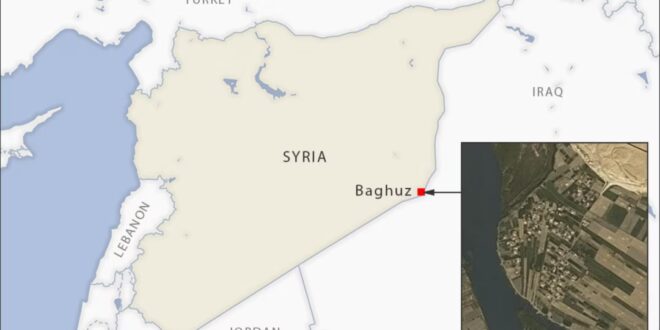U.S. allies in northeastern Syria are intent on prosecuting hundreds of Islamic State foreign fighters for war crimes despite a lack of support from the international community.
The Kurdish-led Autonomous Administration of North and East Syria (AANES) announced Thursday it would begin judicial proceedings for about 2,000 IS foreign fighters held in mostly makeshift prisons since the fall of Baghuz, the terror group’s last Syrian stronghold, in March 2019.
“It’s been almost five years,” Bedran Jia, co-president of the AANES Foreign Relations Office, told reporters, speaking through an interpreter, during a virtual briefing Thursday. “We can no longer keep these people without a trial.”
“They will be public trials,” Jia added. “Everybody – monitors, observers, experts, all the lawyers – they will be welcome in these trials. … It will be very transparent.”
While some AANES officials indicated the first trials could start within days, Jia said no dates had been set and that officials were still seeking both support and cooperation from the international community and from humanitarian organizations that may have collected evidence that could be used in the proceedings.
“They all remained non-responsive,” he told reporters, acknowledging the autonomous government lacks the capacity and resources to fully meet international standards for such prosecutions, such as providing a lawyer for each of the accused, without international support.
Still, he said the AANES was determined to begin proceedings to bring the IS fighters to justice using the facilities and resources it has available, while adhering to the established penal code to hand out punishments for those convicted of crimes.
Jia said there is no death penalty, so any convictions would result in prison sentences while those exonerated of crimes would be set free.
He said it is possible that prosecutors will also charge some women who were captured as the terror group’s self-declared caliphate collapsed, noting that there was evidence some of them took part in atrocities.
This is not the first time the AANES has sought to put captured IS fighters on trial. Over the past several years there have been multiple failed attempts to set up international tribunals.
But the U.S. and other members of the international coalition that formed to defeat IS have been reluctant to support such moves.
“The United States remains focused on repatriating detained foreign terrorist fighters to their areas or countries of origin to be rehabilitated, reintegrated, and prosecuted [or] held, as appropriate, for their crimes,” a State Department spokesperson told VOA, discussing the matter on the condition of anonymity.
“Repatriation remains the only long-term, durable solution to the security challenges presented by the detention centers in northeast Syria,” the official added. “We continue to encourage countries to repatriate their detained foreign terrorist fighters.”
For its part, the U.S. has repatriated at least 39 citizens from Syria and Iraq, including 15 adults and 24 children, since 2016.
Of the adults, at least 11 have been charged with crimes. U.S. officials told VOA that some of the adults were not charged because they were minors when they were brought by their families to join the terror group.
And while other countries have increasingly repatriated the wives and children of IS fighters who have been held in displaced persons camps, the number of foreign fighters in prisons run by the AANES’ military wing, the Syrian Democratic Forces, has stayed steady.
“It’s a very heavy burden. There are so many accused,” the AANES’s Jia said.
It remains unclear, however, how holding trials will ease the burden.
Jia said any detained IS fighters convicted of crimes would serve out their punishments in the existing prisons in northeastern Syria. And it is unclear whether the AANES has any extradition agreements that would allow convicted IS foreign fighters to be sent back to their countries of origin.
“It will depend on the bilateral agreements between us and the relevant countries,” he said. “But as the autonomous administration we are entitled to try and punish them [IS fighters] as a result of a fair trial.”
Starting in 2019, the AANES began holding trials for thousands of detained IS fighters from Syria.
Jia said the majority of them were tried and convicted and are serving out their sentences in the SDF-run prisons while those who were exonerated were set free.
He said some trials are ongoing.
 Eurasia Press & News
Eurasia Press & News




